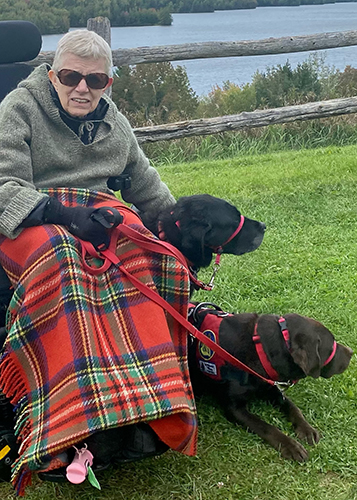
About Jacqui/Saint/Dusty:
Title: Professor of Professional Communication and Journalism, University of Maine a Presque Isle
Diversity, Equity and Inclusion (DEI) Role: University of Maine at Presque Isle DEI Council Co-Chair
Phone: 207-768-9745
Email: jacquelyn.lowman@maine.edu
We are in our 15th year at the University of Maine at Presque Isle (UMPI). Besides teaching professional communication and journalism, we designed and teach UMPI’s first course explicitly devoted to DEI: DEI 101—Becoming a JEDI (Justice, Equity, Diversity, Inclusion). We have been involved in DEI at the campus and system level since we came. We are apparently the only UMS full-time employee who is also a full-time wheelchair user. Add in service dogs Saint and Dusty, and that gives us a unique perspective. It also gives us great empathy for other underrepresented groups. Our wonderful students give us great hope for the future.
“We are better together. We all can make a difference. We all can be that difference. Let us start today.”
What DEI means to me:
If you ask people to define “diversity,” you will get as many different definitions as you have people. Some think of such traditional hierarchical categories as color, gender, and class. Others factor in such additional aspects as age, religion, creed, socioeconomic status, geographical location, ability But these are just some of the more salient characteristics. People combine them in unique ways, pulling in additional factors. Diversity can be magical, exposing us to ideas and perspectives of which we would otherwise never be aware. It can make any group or enterprise better and stronger. But it can also be divisive if one particular brand of diversity takes precedence over others—and over prior hegemonies, if we proceed mindlessly, without careful deliberation and questioning. In our rush to be diverse, to welcome groups and individuals long marginalized, we cannot afford to marginalize, in turn, groups who once held power. We still need contributions from white males, for example, and from those who are financially, environmentally, and socially secure. In our urge to level the playing field, we need to be mindful and not tilt it another way. In a truly integrated global society, no one is expendable. One of our challenges, then, is to interweave the disparate strands of diversity into a cohesive, well-synthesized whole, inextricably intertwined, stronger than the sum of its parts. In short, we need an encompassing form of diversity—we need inclusion. This is the philosophy and application in which every voice matters, can be distinct and sing solo, is prized for the richness it offers. But beyond that—and without losing the wonders of the individual—all are blended into a chorus more powerful than any mere collection of individuals.
